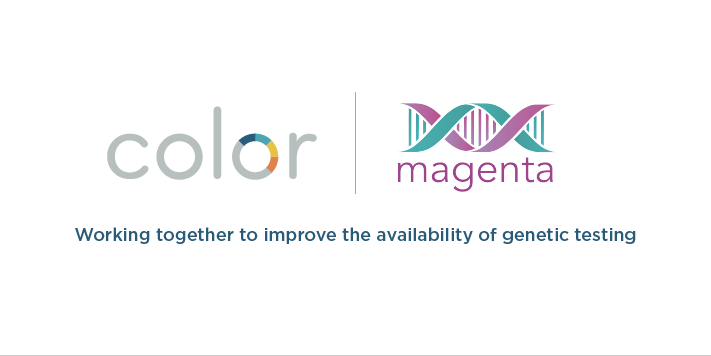News & Articles
The Dream Team you haven’t heard about
Alicia Zhou
At Color, our belief that genetic testing should be, and can be, affordable and accessible applies to our approach to research partnerships, along with everything else. That’s why we’re proud to announce our collaboration with a Stand Up to Cancer Dream Team for the MAGENTA (MAking GENetic Testing Accessible) Study.
MAGENTA aims to improve the availability of genetic testing for hereditary cancer syndromes through the use of the Color Hereditary Cancer Test, genetic counseling, and online education. Led by Drs. Alan D’Andrea from Harvard Medical School and Liz Swisher from University of Washington, the study seeks to study ovarian cancer treatments by working collaboratively, rather than competitively, with a multi-institutional group of scientists and advocacy groups — an effective approach to clinical research.
With 20,000 diagnoses each year, ovarian cancer is the ninth most common cancer, but the fifth leading cause of cancer death, among women in the US¹. 14,000 women die annually from ovarian cancer, because it’s usually diagnosed at an advanced stage, when it’s hard to treat successfully². New effective treatments have been limited. Genetic testing holds new promise, though, by promoting earlier detection of the disease and identifying relevant genetic mutations that could lead to more effective and personalized treatment options.
The study’s goal is to enroll 3,000 participants across the U.S. who have a family history of breast or ovarian cancer. MAGENTA will provide free genetic testing to eligible women, and provide potentially life-saving information that could lead to early ovarian cancer diagnoses. The study also focuses on accessibility and testing new methods of counseling as key objectives; interested participants will be able to easily determine their eligibility online and provide saliva samples for the Color test from the comfort of their own homes.
Enrollees will be studied for two years following the testing, to help guide the development of future web-based testing and counseling strategies for ovarian cancer. This means the MAGENTA study’s findings have the potential to have a long-lasting impact on the diagnosis and treatment of one of the deadliest cancers that affect women.
We encourage women in the Color community to learn more about the MAGENTA study and find out if you’re eligible. Visit http://MAGENTA.mdanderson.org to learn more.
References
- University of California — Riverside. Study sheds light on how ovarian cancer spreads: Long-term goal is to develop treatments that prevent cancer cells from attaching to new sites during metastasis. ScienceDaily. ScienceDaily, 27 June 2017. Available at ScienceDaily.
- Jessmon P et al. Epidemiology and treatment patterns of epithelial ovarian cancer. Expert Rev Anticancer Ther. May 2017;17(5):427–437. Pubmed Abstract.




